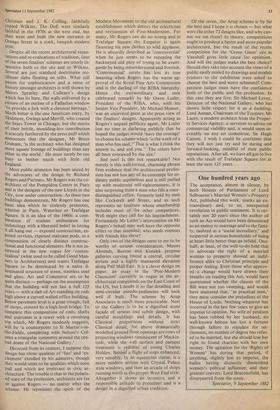One hundred years ago
The acceptance, almost in silence, by both Houses of Parliament of Lord Selbourne's Married Women's Property Act, published this week, marks an ex- traordinary and, to us, unexpected revolution in public sentiment. It is cer- tainly not 20 years since the author of such an Act would have been denounced as an enemy to marriage and to the fami- ly, taunted as a 'social incendiary,' and suspected in serious households of being at heart little better than an infidel. One- half, at least, of the well-to-do held that to advocate the right of a married woman to property showed an indif- ference alike to Christian principle and proper feeling. Even those who approv- ed a change would have drawn their breaths on reading this Act, would have questioned whether the clauses of the Bill were not too sweeping, and would have muttered that, 'as practical men,' they must consider the prejudices of the House of Lords. Nothing whatever has occurred in the last few years to give an impetus to opinion. No wife of position has been robbed by her husband, no well-known heiress has lost a fortune through failure to stipulate for set- tlements, no maiden of degree has refus- ed to be married, lest she should lose het right to found charities with her own money. The agitation for the `Rights of Women' has during that period, if anything, slightly lost its impetus, the ballot having distinctly diminished women's political influence; and their greatest convert, Lord Beaconsfield, has disappeared from the scene.
Spectator, 9 September 1882


































 Previous page
Previous page